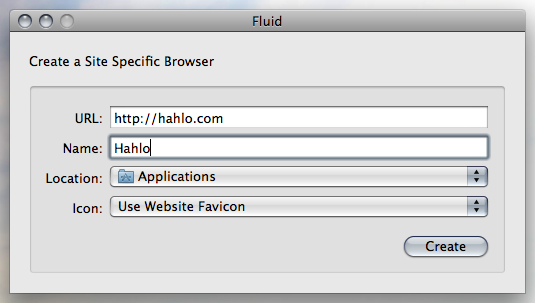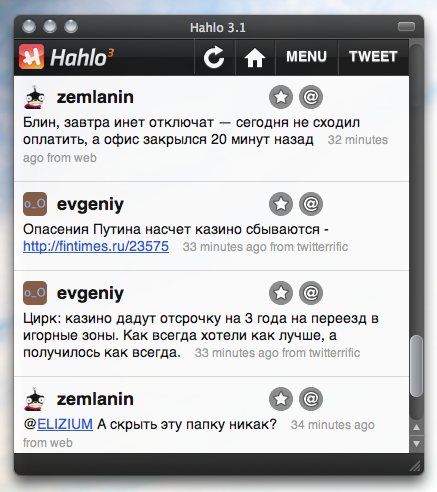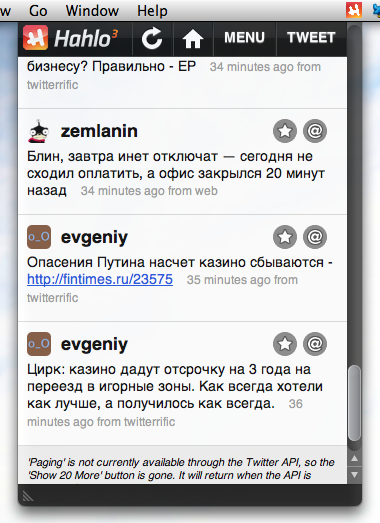Desktop Web Applications: Fluid.app
With the advent of the meaningful term Web 2.0, much has changed in our lives: people began to write more (perhaps many people began to write at all), new means of communication appeared, newly-minted web applications began to replace offline ones. The activity of a typical person is centered around the browser.
Over the past three years, many wonderful, innovative, necessary web applications have been born. Take, say, the Basecamp from 37Signals - now it has become possible to work comfortably in a small group of people located in different parts of the Earth. Or, say, Highrise from the same developers - small businesses have a simple tool for managing and interacting with customers. Another thing is that from the usual browser it became a little uncomfortable to work: you always get lost in numerous windows and tabs. Site Specific browsers (SSB), that is, browsers designed to work with a single site, began to appear. Probably the most prominent of them on the Mac OS X platform was Fluid .
Fluid in the blink of an eye allows you to create a browser application that will work with a specific site without being distracted by anything else. Fluid allows you to set a special icon (by the way, you can find them in the Fluid Icons group in Flickr) or use the Favicon site. For example, I sometimes have to view DOC files, but I do not have Microsoft Office installed. In such cases, I use Google Docs and did SSB for it in Fluid. Now Google Docs is not lost in the tabs displayed in Exposé. And so you can do absolutely any site. Want to read Twitter not via Twitterific, but through Hahlo? Easy!
First, open Fluid, enter the URL (http://hahlo.com), the desired name and icon.
')

After a couple of seconds, a new application will be created and Fluid will offer to open it. Voilá:

For Hahlo, it makes sense not to keep the whole window open, but to turn it into something like Twitterific, that is, a window called from the menu bar. This is done by selecting the menu item (of the program itself) Hahlo → Convert to MenuExtraSSB. We get the desired.

The most interesting part of Fluid is its support for the GreaseMonkey plug-ins and scripts already taken root in Firefox. For example, if you make SSB for Google Reader , then using scripts in the dock, you can display a badge with the number of unread news and change the appearance beyond recognition. The same can be done for the Mebo web messenger. It is quite possible to replace the paid Mailplane (client for Gmail) with its fluid counterpart, you can continue indefinitely. Fluid is constantly being improved and you can read about upcoming innovations in the official blog . A community of people who regularly use Fluid for various purposes has already been organized around Fluid. Some of them write manuals , while others write user scripts for Fluid.
As for me, I have already registered several SSBs made with Fluid at the dock: Campfire, Google Docs, Hahlo, Fluther and Mint. And what will you register?
via Haywired.ru - all Mac blogs suck, Haywired is a little less
Over the past three years, many wonderful, innovative, necessary web applications have been born. Take, say, the Basecamp from 37Signals - now it has become possible to work comfortably in a small group of people located in different parts of the Earth. Or, say, Highrise from the same developers - small businesses have a simple tool for managing and interacting with customers. Another thing is that from the usual browser it became a little uncomfortable to work: you always get lost in numerous windows and tabs. Site Specific browsers (SSB), that is, browsers designed to work with a single site, began to appear. Probably the most prominent of them on the Mac OS X platform was Fluid .
Fluid in the blink of an eye allows you to create a browser application that will work with a specific site without being distracted by anything else. Fluid allows you to set a special icon (by the way, you can find them in the Fluid Icons group in Flickr) or use the Favicon site. For example, I sometimes have to view DOC files, but I do not have Microsoft Office installed. In such cases, I use Google Docs and did SSB for it in Fluid. Now Google Docs is not lost in the tabs displayed in Exposé. And so you can do absolutely any site. Want to read Twitter not via Twitterific, but through Hahlo? Easy!
First, open Fluid, enter the URL (http://hahlo.com), the desired name and icon.
')

After a couple of seconds, a new application will be created and Fluid will offer to open it. Voilá:

For Hahlo, it makes sense not to keep the whole window open, but to turn it into something like Twitterific, that is, a window called from the menu bar. This is done by selecting the menu item (of the program itself) Hahlo → Convert to MenuExtraSSB. We get the desired.

The most interesting part of Fluid is its support for the GreaseMonkey plug-ins and scripts already taken root in Firefox. For example, if you make SSB for Google Reader , then using scripts in the dock, you can display a badge with the number of unread news and change the appearance beyond recognition. The same can be done for the Mebo web messenger. It is quite possible to replace the paid Mailplane (client for Gmail) with its fluid counterpart, you can continue indefinitely. Fluid is constantly being improved and you can read about upcoming innovations in the official blog . A community of people who regularly use Fluid for various purposes has already been organized around Fluid. Some of them write manuals , while others write user scripts for Fluid.
As for me, I have already registered several SSBs made with Fluid at the dock: Campfire, Google Docs, Hahlo, Fluther and Mint. And what will you register?
via Haywired.ru - all Mac blogs suck, Haywired is a little less
Source: https://habr.com/ru/post/28706/
All Articles